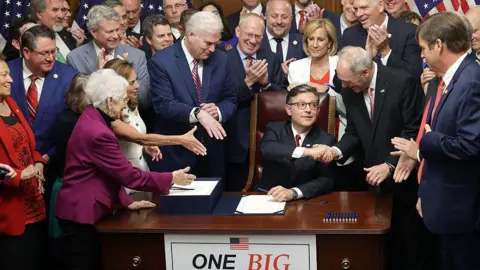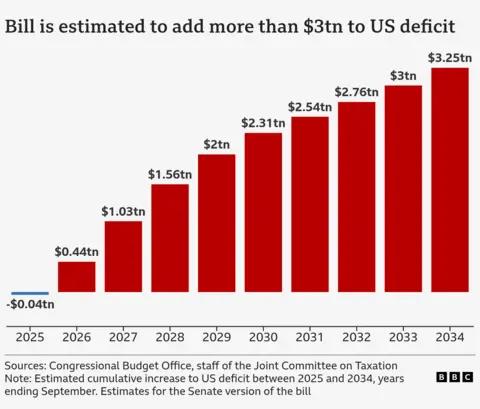A signing ceremony at the White House on Friday afternoon will kick off celebrations for 4 July.
Trump to sign sweeping tax and spending bill into law
US President Donald Trump is to sign his landmark policy bill into law, a day after it was narrowly passed by Congress.
The signing event at the White House on Friday afternoon, coinciding with 4 July celebrations, enacts key parts of the Trump agenda including tax cuts, spending boosts for defence and the immigration crackdown.
Trump began his victory lap at an Iowa rally on Thursday night, telling supporters it will unleash economic growth, but he must now convince sceptical Americans as polling suggests many disapprove.
Several members of his own Republican party were opposed because of the impact on rising US debt and Democrats warned the bill would reward the wealthy and punish the poor.
The 870-page package includes:
- extending 2017 tax cuts of Trump’s first term
- steep cuts to Medicaid spending, the state-provided healthcare scheme for those on low incomes and the disabled
- new tax breaks on tipped income, overtime and Social Security
- a budget increase of $150bn for defence
- a reduction in Biden-era clean energy tax credits
- $100bn to Immigration and Customs Enforcement (ICE)
The bill signing will precede 4 July American Independence Day fireworks and a military picnic attended by the pilots who recently flew into Iran to try to dismantle three nuclear sites.
The celebratory mood follows days of tense negotiations with Republican rebels in Congress and days of cajoling on Capitol Hill, sometimes by the president himself.
House Minority Leader Hakeem Jeffries delayed the final vote in the lower chamber of Congress on Thursday by speaking for nearly nine hours.
He called the bill an “extraordinary assault on the healthcare of the American people” and quoted testimony from individuals anxious about its impact.
But his marathon speech only postponed the inevitable. As soon as he sat down, the House moved to a vote.
 Getty Images
Getty ImagesOnly two Republicans went against, joining all 212 Democrats united in opposition. The bill passed by 218 votes to 214.
Earlier this week, the Senate passed the bill but US Vice-President JD Vance was required to cast a tiebreaking vote after three Republicans held out.
Hours after the House passed the bill, the president was in a triumphant mood as he took to the stage in Iowa to kick off a years long celebration of 250 years since American independence.
“There could be no better birthday present for America than the phenomenal victory we achieved just hours ago,” he told supporters in Des Moines.
“Very simply the One Big, Beautiful Bill will deliver the strongest border on Earth, the strongest economy on Earth [and] the strongest military on Earth.”
The White House believes the various tax cuts will help stimulate economic growth, but many experts fear that will not be sufficient to prevent the budget deficit – the difference between spending and tax revenue in any year – from ballooning, adding to the national debt.
Analysis by the Congressional Budget Office (CBO) suggests the tax cuts could produce a surplus in the first year but will then cause the deficit to rise sharply.

According to the Tax Policy Center, the tax changes in the bill would benefit wealthier Americans more than those on lower incomes, About 60% of the benefits would go to those making above $217,000 (£158,000), its analysis found.
The BBC spoke to Americans who may see a cut in the subsidies that help them pay for groceries.
Jordan, a father of two, is one of 42 million Americans who benefits from the SNAP (Supplemental Nutrition Assistance Program) scheme targeted by the bill.
He and his wife get about $700 a month to feed their family of four and the 26-year-old said if this bill reduces what he can claim he would get a second job. “I’m going to make sure that I can do whatever I can to feed my family,” he says.
Along with cuts to SNAP, the changes to Medicaid – a programme that covers healthcare for low-income, elderly and disabled Americans – would result in nearly 12 million losing coverage in the next decade, the CBO estimates.
Republicans defend their changes to Medicaid, saying that by toughening up work requirements they are tackling abuse and fraud.
Polling taken before the bill passed in Congress suggests public support is low and dwarfed by numbers opposed. A recent Quinnipiac University survey pointed to only 29% endorsing the legislation, which rose to two-thirds among Republicans.
But knowledge of the bill may be low too. Reuters reported there was little awareness of the legislation among Trump supporters they spoke to at the Iowa rally on Thursday night.






